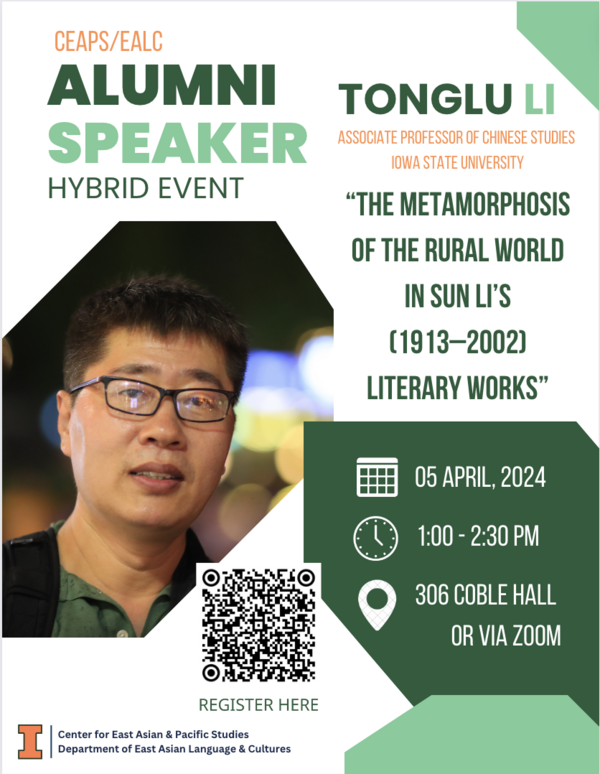
CEAPS/EALC Alumni Speaker | Tonglu Li “The Metamorphosis of the Rural World in Sun Li’s (1913–2002) Literary Works
- Event Type
- Lecture
- Sponsor
- Center For East Asian and Pacific Studies; Co-Sponsor: Department of East Asian Languages and Culture
- Location
- 306 Coble Hall (801 S. Wright Street, 3rd Floor)
- Date
- Apr 5, 2024 1:00 - 2:30 pm
- Speaker
- Tonglu Li (Associate Professor of Chinese Studies, Iowa State University)
- Registration
- Registration (Hybrid Event; Lunch provided for in-person attendees)
- Contact
- Yuchia Chang
- yuchia@illinois.edu
- Views
- 280
- Originating Calendar
- CEAPS Events Calendar
Focusing on the changing images of the rural world in Sun Li’s works, from the Sino-Japanese war to the collectivization, and to the post-Mao years, this talk intends to explore the complexity of realism in modern Chinese literature. As a veteran writer, Sun Li is highly influential in China but less noticed in the English-speaking world, perhaps due to political and ideological reasons. He has been labeled as a “revolutionary” writer, a “fellow traveler” of revolutionary literature, a marginal writer, and a great modern Confucian. He regards himself simply as a realistic writer with a dedication to the representation of the rural world. However, as a highly contested concept in modern China, realism has been eventually reduced to a political and ideological mandate since the 1930s. Sun Li did not openly question the official definition of realism, but he demonstrated a different and more comprehensive understanding of the concept through his literary creation. His realism went beyond the mainstream’s obsession with the political and ideological, and reached to the dimensions of the corporal, the natural, and the familial.
Tonglu Li is an Associate Professor of Chinese Studies in the Department of World Languages and Cultures at Iowa State University. His primary research area is 20th century Chinese literature and intellectual history, with a focus on the issues of enlightenment, nationalism, violence, and religious belief. He received his PhD from the University of Illinois at Urbana-Champaign in 2009.